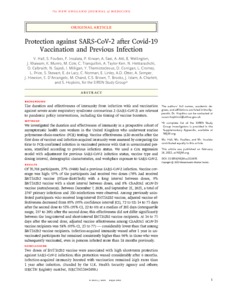Hall, V;
Foulkes, S;
Insalata, F;
Kirwan, P;
Saei, A;
Atti, A;
Wellington, E;
Khawam, J;
Munro, K;
Cole, M;
et al.
Hall, V; Foulkes, S; Insalata, F; Kirwan, P; Saei, A; Atti, A; Wellington, E; Khawam, J; Munro, K; Cole, M; Tranquillini, C; Taylor-Kerr, A; Hettiarachchi, N; Calbraith, D; Sajedi, N; Milligan, I; Themistocleous, Y; Corrigan, D; Cromey, L; Price, L; Stewart, S; de Lacy, E; Norman, C; Linley, E; Otter, AD; Semper, A; Hewson, J; D'Arcangelo, S; Chand, M; Brown, CS; Brooks, T; Islam, J; Charlett, A; Hopkins, S; SIREN Study Group
(2022)
Protection against SARS-CoV-2 after Covid-19 Vaccination and Previous Infection.
N Engl J Med, 386 (13).
pp. 1207-1220.
ISSN 1533-4406
https://doi.org/10.1056/NEJMoa2118691
SGUL Authors: Planche, Timothy David
![[img]](https://openaccess.sgul.ac.uk/116303/1.hassmallThumbnailVersion/Protection%20against%20SARS-CoV-2%20after%20Covid-19%20Vaccination%20and%20Previous%20Infection.pdf)  Preview |
|
PDF
Accepted Version
Available under License ["licenses_description_publisher" not defined].
Download (612kB)
| Preview
|
Abstract
BACKGROUND: The duration and effectiveness of immunity from infection with and vaccination against severe acute respiratory syndrome coronavirus 2 (SARS-CoV-2) are relevant to pandemic policy interventions, including the timing of vaccine boosters. METHODS: We investigated the duration and effectiveness of immunity in a prospective cohort of asymptomatic health care workers in the United Kingdom who underwent routine polymerase-chain-reaction (PCR) testing. Vaccine effectiveness (≤10 months after the first dose of vaccine) and infection-acquired immunity were assessed by comparing the time to PCR-confirmed infection in vaccinated persons with that in unvaccinated persons, stratified according to previous infection status. We used a Cox regression model with adjustment for previous SARS-CoV-2 infection status, vaccine type and dosing interval, demographic characteristics, and workplace exposure to SARS-CoV-2. RESULTS: Of 35,768 participants, 27% (9488) had a previous SARS-CoV-2 infection. Vaccine coverage was high: 95% of the participants had received two doses (78% had received BNT162b2 vaccine [Pfizer-BioNTech] with a long interval between doses, 9% BNT162b2 vaccine with a short interval between doses, and 8% ChAdOx1 nCoV-19 vaccine [AstraZeneca]). Between December 7, 2020, and September 21, 2021, a total of 2747 primary infections and 210 reinfections were observed. Among previously uninfected participants who received long-interval BNT162b2 vaccine, adjusted vaccine effectiveness decreased from 85% (95% confidence interval [CI], 72 to 92) 14 to 73 days after the second dose to 51% (95% CI, 22 to 69) at a median of 201 days (interquartile range, 197 to 205) after the second dose; this effectiveness did not differ significantly between the long-interval and short-interval BNT162b2 vaccine recipients. At 14 to 73 days after the second dose, adjusted vaccine effectiveness among ChAdOx1 nCoV-19 vaccine recipients was 58% (95% CI, 23 to 77) - considerably lower than that among BNT162b2 vaccine recipients. Infection-acquired immunity waned after 1 year in unvaccinated participants but remained consistently higher than 90% in those who were subsequently vaccinated, even in persons infected more than 18 months previously. CONCLUSIONS: Two doses of BNT162b2 vaccine were associated with high short-term protection against SARS-CoV-2 infection; this protection waned considerably after 6 months. Infection-acquired immunity boosted with vaccination remained high more than 1 year after infection. (Funded by the U.K. Health Security Agency and others; ISRCTN Registry number, ISRCTN11041050.).
| Item Type: |
Article
|
| Additional Information: |
From New England Journal of Medicine, Hall, V; Foulkes, S; Insalata, F; Kirwan, P; Saei, A; Atti, A; Wellington, E; Khawam, J; Munro, K; Cole, M; et al. , Protection against SARS-CoV-2 after Covid-19 Vaccination and Previous Infection, 386, 1207-1220. Copyright © 2022 Massachusetts Medical Society. Reprinted with permission. |
| Keywords: |
Adaptive Immunity, Asymptomatic Diseases, BNT162 Vaccine, COVID-19, COVID-19 Nucleic Acid Testing, COVID-19 Vaccines, ChAdOx1 nCoV-19, Health Personnel, Humans, Prospective Studies, SARS-CoV-2, United Kingdom, Vaccination, Vaccine Efficacy, SIREN Study Group, Humans, Vaccination, Prospective Studies, Health Personnel, Adaptive Immunity, Asymptomatic Diseases, United Kingdom, COVID-19, SARS-CoV-2, COVID-19 Vaccines, COVID-19 Nucleic Acid Testing, Vaccine Efficacy, BNT162 Vaccine, ChAdOx1 nCoV-19, 11 Medical and Health Sciences, General & Internal Medicine |
| SGUL Research Institute / Research Centre: |
Academic Structure > Infection and Immunity Research Institute (INII) |
| Journal or Publication Title: |
N Engl J Med |
| ISSN: |
1533-4406 |
| Language: |
eng |
| Publisher License: |
Publisher's own licence |
| Projects: |
|
| PubMed ID: |
35172051 |
| Web of Science ID: |
WOS:000755954500001 |
| Dates: |
| Date |
Event |
| 2022-03-31 |
Published |
| 2022-02-16 |
Published Online |
|
 |
Go to PubMed abstract |
| URI: |
https://openaccess.sgul.ac.uk/id/eprint/116303 |
| Publisher's version: |
https://doi.org/10.1056/NEJMoa2118691 |
Statistics
Item downloaded times since 14 Mar 2024.
Actions (login required)
 |
Edit Item |



